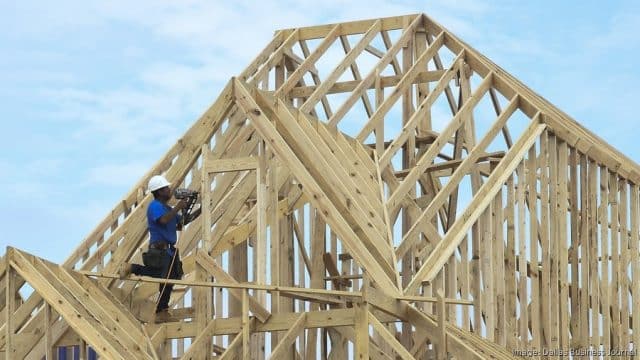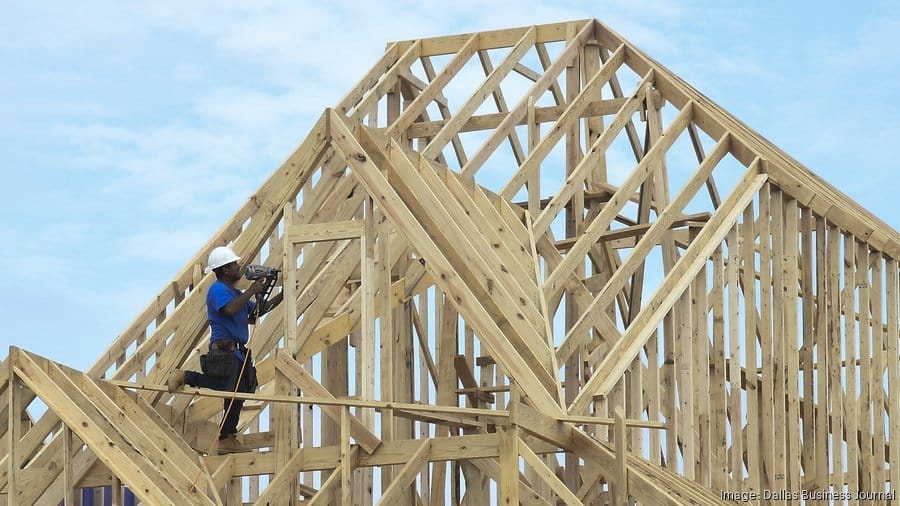
Economists say a dwindling supply of affordable, desirable housing is one of the most serious threats facing Dallas and the wider Metroplex. JAKE DEAN
In the $1.25 billion bond package recently set by Dallas City Council, funding for housing and neighborhood infrastructure will be about $26.4 million — less than what housing advocates had called for in the weeks and months leading up to the vote.
The outcome was expected as many city hall insiders had been focused on money for issues like road improvements and new parks.
Yet a dwindling supply of affordable, desirable housing has been identified by economists as one of the most serious threats facing Dallas and the wider Metroplex. The San Antonio, Orlando and Dallas metros were highlighted as the places with the worst housing shortages in the country in the second quarter of 2023, according to an analysis by Bank of America researchers.
That’s causing residents to look elsewhere: Both the city and Dallas County more widely have lost population in recent years. The problem is acute among young families: Dallas County’s number of households with children under age 5 decreased 5% from April 2020 to July 2022, according to a 2023 report by the Economic Innovation Group.
So, without a major influx of local government funding for housing, what can be done to alleviate the shortage?
For one, the city should focus on streamlining permitting and clearing up other kinds of red tape that can make building housing in Dallas a slow process, developers say.
Zoning cases often take about 10 to 14 months in the Metroplex’s largest city, while cases in Plano and Fort Worth may take about three or four months, said Dallas Cothrum, president of permitting consulting firm Masterplan. He blamed the difference on low staff levels, low pay, low morale and political interference.
2024 local elections: Dallas voters will decide May 4 on whether to issue $1.25 billion in debt to address priorities in areas including $521 million for street and transportation projects, $345 million for parks, $72.3 million for economic development, a combined $45 million for housing and homelessness and $52.1 million for flood protection.
City staffers should aggressively recommend approval for affordable housing projects at a high level of density and take zoning cases faster, Cothrum added. And city officials should stand up for affordable housing, even if it means disagreeing with their constituents, he said.

Dallas Cothrum is president of Masterplan. MASTERPLAN
“Dallas has had many opportunities to do affordable housing,” Cothrum said. “Council members will say that they are in favor of it. But when it comes time to vote on it, and a small or large number of neighbors espouse opinions that they’re hostile to it, they vote against it. Until there’s enough courage to say affordable housing is more important than my constituent’s opinion, we’re not going to have enough of it.”
Luckily, more of that kind of development is in the pipeline. Dallas City Council on Feb. 14 voted in favor of seven mixed-income residential projects that could add nearly 950 units to the city. More than half of the communities will feature more than 100 units, and two will be designated for those ages 55 and older.
The largest project was for 240 units: the Dallas Public Facility Corp. will acquire the site at 4000 Ash Lane and enter into a 75-year lease with developer Larkspur Capital LP.
“As we have often heard speakers come before us and talk about the need for creating housing, I just want to make sure we’re understanding that week in and week out, we are actually creating significant housing through the channels that are available to us,” Council Member Cara Mendelsohn said during the meeting. “Some of that are state. Some of that are part of our own finance arms. But this is happening, and this is happening all the time at the council level.”
With real estate costs up across the board, Strategic Realty Holdings CEO Eddie Lorin doesn’t see how building mixed-income projects is feasible without at least some public investment. But that doesn’t have to come from bond money: Lorin said other steps could include increasing contributions to low-income housing tax credits and providing low-interests loans or grants.

Eddie Lorin is CEO of Strategic Realty Holdings, a real estate investment company.
STRATEGIC REALTY HOLDINGS
He also sees an opportunity for the city to partner with developers on purchasing older properties. Dallas usually offers opportunities for new projects, but buying and renovating older complexes is often cheaper than building and makes it easier to provide lower rents, he said.
“Low market money is needed to come in to help the city create more housing, because the cost of capital is the most important part of a real estate deal,” Lorin said. “If you’re having to pay market rate returns, then you can’t do anything but market rate rents. If you want to incentivize lower rents, you have to come in with philanthropic or government.”
That kind of approach roughly resembles what Mayor Eric Johnson called for during the bond campaign, with a reliance on the private sector to handle housing issues.
“The real approach to affordable housing in the city is to get the permitting right, make zoning more navigable for builders [and] encourage homebuilders to build more housing of all types,” he said Jan. 11 at a North Dallas Chamber of Commerce event.
…
https://www.bizjournals.com/dallas/news/2024/02/23/housing-shortage-permitting-fixes-cothrum-lorin.html

